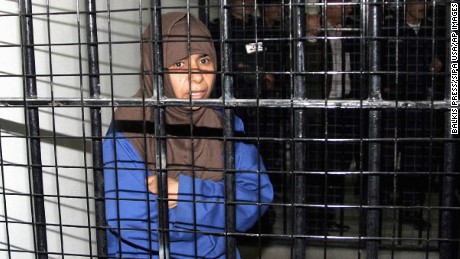Jordan swiftly responded to the brutal killing of one of its fighter pilots by ISIS, announcing the executions of two jihadist prisoners early Wednesday.
One of the convicts hanged, according to the Jordanian government, was Sajida al-Rishawi, a would-be suicide bomber whose release ISIS had previously demanded as part of a prisoner exchange.
The other was Ziad Karbouli, a former top aide to the deceased leader of al Qaeda in Iraq, Abu Musab al-Zarqawi. Their deaths followed the horrific footage released Tuesday by ISIS that showed the Jordanian pilot, Moath al-Kasasbeh, being burned alive while confined in a cage.
CNN is not showing images of al-Kasasbeh’s killing, which drew global condemnation and prompted protests and vows of retaliation in Jordan. “Those criminals cannot be compared to Moath,” said al-Kasasbeh’s father, Safi, referring to the prisoners’ execution. “Moath’s blood is much more valued than these two prisoners.”
He called on the Jordanian government to execute all prisoners with links to ISIS. “Annihilate this organization,” he said. His sentiments found voice on the streets of Amman, the capital, and in the pilot’s hometown. One demonstrator held a poster that read: “They burned our hearts, so let’s burn their dens, and their prisoners in our prisons.”
Jordanian government spokesman Mohammad al-Momani vowed “an earthshaking retaliation” and “a revenge that equals the tragedy that has befallen the Jordanians.” But the executions of the two prisoners with ties to al Qaeda in Iraq, a precursor to ISIS, came quicker than some observers had expected.
In previous public messages, ISIS had linked al-Rishawi to the fates of the Jordanian pilot and Kenji Goto, a Japanese hostage whose killing the militant group publicized over the weekend.
Jordan last week said it was willing to release al-Rishawi in exchange for al-Kasasbeh, but the swap never happened. The Jordanian government repeatedly asked ISIS to show proof that the pilot was still alive.
Shortly after the video of al-Kasasbeh’s killing became public, Jordanian military spokesman Mamdouh Al Amri said authorities believed the pilot had been killed as far back as January 3, before ISIS began making its public demands for the release of al-Rishawi.










